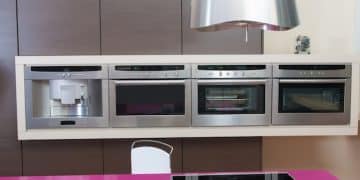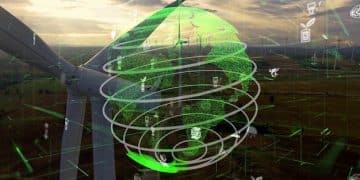Energy-Efficient Appliances: Save Money & Reduce Impact
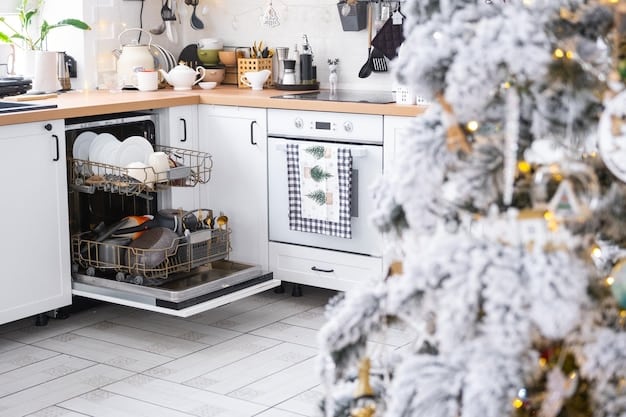
Energy-efficient appliances not only lower your utility bills but also contribute significantly to reducing your environmental footprint by consuming less energy and minimizing greenhouse gas emissions.
Are you looking for ways to save money on your energy bills while also making a positive impact on the environment? Investing in energy-efficient appliances is a smart and sustainable solution. Let’s explore how these appliances can benefit both your wallet and the planet.
Understanding Energy-Efficient Appliances
Energy-efficient appliances are designed to use less energy than standard models, reducing overall energy consumption and lowering your carbon footprint. These appliances often come with the Energy Star label, indicating they meet strict energy efficiency guidelines set by the U.S. Environmental Protection Agency (EPA).
But what exactly makes an appliance energy-efficient? It’s all about using advanced technologies and designs that minimize energy waste, such as improved insulation, optimized motors, and smart sensors that adjust performance based on actual needs.
Key Features of Energy-Efficient Appliances
Energy-efficient appliances incorporate several features that help reduce energy consumption. Look for these key characteristics when shopping for new appliances:
- Energy Star Certification: Appliances with the Energy Star label meet strict energy efficiency standards.
- Advanced Insulation: Better insulation in refrigerators and ovens helps maintain temperature with less energy.
- Smart Sensors: These sensors adjust appliance performance based on actual needs, reducing energy waste.
- Optimized Motors: Efficient motors in washing machines and dryers use less electricity to perform the same tasks.
By focusing on these features, you can ensure that your appliances are contributing to energy savings and environmental sustainability.
In summary, understanding the core principles and features of energy-efficient appliances allows you to make informed decisions that benefit both your finances and the environment. The Energy Star label is a reliable indicator of an appliance’s efficiency, and focusing on features like better insulation and optimized motors can lead to significant energy savings.
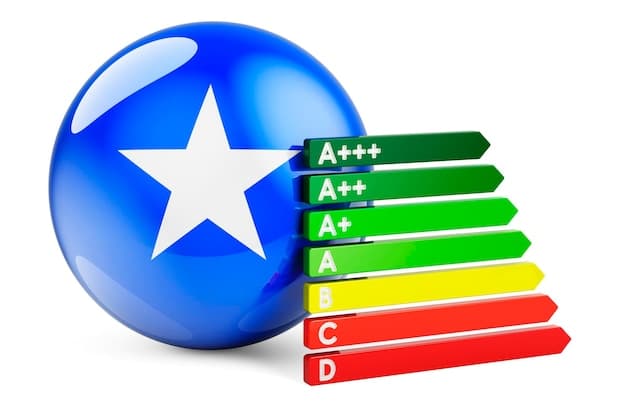
Benefits of Switching to Energy-Efficient Appliances
Switching to energy-efficient appliances brings a multitude of advantages. Beyond the obvious reduction in energy bills, there are several long-term benefits for both your household and the environment.
Reduced energy consumption translates directly into lower monthly expenses and contributes to a more sustainable lifestyle. Let’s explore these benefits in more detail.
Lower Utility Bills
One of the most immediate benefits of using energy-efficient appliances is the reduction in your utility bills. These appliances consume less electricity and water, leading to significant savings over time.
- Reduced Electricity Costs: Appliances like refrigerators and washing machines use less power, resulting in lower electricity bills.
- Lower Water Bills: High-efficiency washing machines and dishwashers use less water per cycle, reducing your water bill.
- Long-Term Savings: Over the lifespan of the appliance, the savings can be substantial, often offsetting the initial higher purchase price.
Environmental Impact
Aside from the financial benefits, energy-efficient appliances play a crucial role in reducing your environmental impact. By using less energy, these appliances help lower greenhouse gas emissions and conserve natural resources.
- Reduced Greenhouse Gas Emissions: Lower energy consumption means less demand for fossil fuels, reducing carbon emissions.
- Conservation of Natural Resources: Efficient appliances help conserve water and other resources, contributing to a more sustainable future.
- Promotion of Sustainable Living: Using energy-efficient appliances promotes a more environmentally responsible lifestyle.
In conclusion, the benefits of switching to energy-efficient appliances extend beyond just saving money on your utility bills. The positive impact on the environment, through reduced emissions and conservation of resources, makes it a worthwhile investment for a sustainable future.
Choosing the Right Energy-Efficient Appliances
Selecting the right energy-efficient appliances can feel overwhelming with the variety of options available. Knowing what to look for and understanding your specific needs can simplify the process.
Consider your household size, usage habits, and budget when making your decisions. Here’s a guide to help you choose the best appliances for your home.
Understanding the Energy Star Label
The Energy Star label is a crucial tool for identifying energy-efficient appliances. Appliances with this label have been certified by the EPA to meet strict energy efficiency standards.
Look for the Energy Star label to ensure that the appliance meets high standards for energy efficiency. The label provides information on energy consumption, helping you compare different models.
Factors to Consider When Buying
When purchasing energy-efficient appliances, consider several factors to ensure you make the best choice for your needs:
- Size and Capacity: Choose the right size appliance for your household to avoid wasting energy.
- Features: Look for features that enhance energy efficiency, such as smart sensors and improved insulation.
- Cost: Compare the upfront cost with the long-term savings on energy bills to determine the true value.
Specific Appliance Types
Different types of appliances have varying levels of energy efficiency. Here’s what to look for when buying specific appliances:
- Refrigerators:
- Look for models with advanced insulation and adaptive defrost.
- Consider size – a smaller fridge uses less energy.
- Washing Machines:
- Choose high-efficiency (HE) models that use less water.
- Look for Energy Star-certified washers.
- Dishwashers:
- Opt for models with soil sensors and efficient wash cycles.
- Check the Energy Star rating for water and energy consumption.
Selecting the right energy-efficient appliances requires careful consideration of your needs and the features offered by different models. The Energy Star label is a valuable guide, and understanding the specific requirements for each appliance type can help you make an informed decision. By considering these factors, you can choose appliances that save energy and reduce your environmental impact.
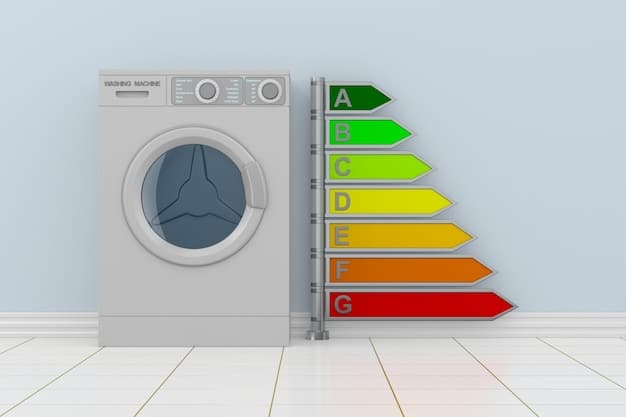
Tips for Maximizing Energy Efficiency
Once you’ve invested in energy-efficient appliances, it’s essential to use them effectively to maximize their energy-saving potential. Simple changes in your usage habits can make a significant difference.
Proper maintenance and mindful use can ensure that your appliances operate at peak efficiency, saving you more money and reducing your environmental impact.
Proper Installation and Maintenance
Correct installation and regular maintenance are crucial for ensuring your appliances run efficiently. Follow these tips to keep your appliances in top condition:
- Read the Manual: Understand the manufacturer’s instructions for proper installation and maintenance.
- Regular Cleaning: Clean appliances regularly to prevent buildup that can reduce efficiency.
- Check Seals and Filters: Ensure seals and filters are in good condition and replace them when necessary.
Proper installation and regular maintenance are essential for ensuring your appliances run efficiently and have a longer lifespan.
Efficient Usage Habits
Adopting efficient usage habits can also significantly impact your energy consumption. Here are some key practices to consider:
- Run Full Loads:
Operate washing machines and dishwashers only when they are fully loaded to maximize efficiency.
- Use Energy-Saving Modes:
Utilize energy-saving modes and settings on your appliances whenever possible.
- Unplug When Not in Use:
Unplug appliances when they are not in use to eliminate standby power consumption.
In conclusion, maximizing the energy efficiency of your appliances involves both proper maintenance and mindful usage habits. By following these tips, you can ensure that your appliances operate at their best, saving you money and reducing your environmental impact.
Long-Term Cost Savings
The long-term cost savings from energy-efficient appliances are a significant benefit, often outweighing the initial investment. These savings are not just limited to lower utility bills but also extend to reduced maintenance and longer appliance lifespans.
Understanding these long-term financial advantages can help you make a more informed decision when purchasing new appliances.
Calculating Savings Over Time
To fully appreciate the economic benefits of energy-efficient appliances, it’s helpful to calculate the potential savings over their lifespan. Consider the following:
- Energy Consumption: Compare the energy consumption of standard and energy-efficient models.
- Utility Costs: Estimate your annual utility costs with both types of appliances.
- Lifespan: Factor in the expected lifespan of the appliance.
By considering these factors, you can estimate the total savings over the appliance’s lifespan and make a more informed decision.
Additional Financial Incentives
In addition to the direct savings on utility bills, there are often financial incentives available to encourage the purchase of energy-efficient appliances. These incentives can include:
- Rebates: Many utility companies offer rebates for purchasing Energy Star-certified appliances.
- Tax Credits: Federal and state governments may offer tax credits for energy-efficient purchases.
- Grants: Some organizations provide grants to help homeowners upgrade to energy-efficient appliances.
In conclusion, the long-term cost savings associated with energy-efficient appliances are substantial and should be a key consideration when making purchasing decisions. By calculating potential savings, taking advantage of financial incentives, and understanding the extended lifespan of these appliances, you can make a financially sound and environmentally responsible choice.
Future Trends in Energy Efficiency
The field of energy-efficient appliances is constantly evolving, with new technologies and innovations emerging regularly. Keeping an eye on future trends can help you make even smarter choices when it comes to household appliances.
From smart home integration to even more efficient designs, the future of energy-efficient appliances looks promising.
Smart Home Integration
One of the most significant trends in energy-efficient appliances is the integration with smart home systems. These systems allow you to monitor and control your appliances remotely, optimizing energy usage and reducing waste.
- Remote Monitoring: Monitor energy consumption from your smartphone or tablet.
- Automated Adjustments: Smart systems can automatically adjust appliance settings to optimize energy efficiency.
- Integration with Smart Grids: Connect your appliances to smart grids for even greater energy savings.
Emerging Technologies
New technologies are continuously being developed to improve the energy efficiency of appliances. Some of the most promising developments include:
- Advanced Materials: New materials that provide better insulation and heat transfer.
- Improved Motors: More efficient motors that use less electricity.
- AI-Powered Optimization: Artificial intelligence algorithms that optimize appliance performance based on usage patterns.
Staying informed about these advancements can help you make future-proof choices when selecting energy-efficient appliances for your home.
| Key Point | Brief Description |
|---|---|
| 💰 Lower Bills | Reduces monthly energy and water costs significantly. |
| 🌍 Eco-Friendly | Lowers greenhouse gas emissions and conserves resources. |
| ⭐ Energy Star | Ensures appliances meet strict energy efficiency standards. |
| 💡 Smart Tech | Integration with smart home systems for optimized usage. |
Frequently Asked Questions
Energy-efficient appliances are designed to consume less energy while performing the same functions as standard appliances. They often have the Energy Star label, indicating they meet strict energy efficiency guidelines.
Look for the Energy Star label. This label, provided by the EPA, indicates that the appliance meets specific energy efficiency standards. Also, check the appliance’s energy consumption information.
Using energy-efficient appliances lowers your utility bills, reduces your carbon footprint, and conserves natural resources. Over time, the savings on energy costs can be significant, offsetting the initial investment.
Energy-efficient appliances may have a higher upfront cost than standard appliances. However, the long-term savings on utility bills and potential rebates and tax credits often make them a more cost-effective choice.
Ensure proper installation and regular maintenance, such as cleaning and replacing filters. Also, adopt efficient usage habits like running full loads in washing machines and dishwashers, and unplugging appliances when not in use.
Conclusion
Investing in energy-efficient appliances is a win-win solution. You save money on your utility bills while also contributing to a more sustainable future. By understanding the benefits, choosing the right appliances, and adopting efficient usage habits, you can make a significant impact on both your wallet and the environment.

